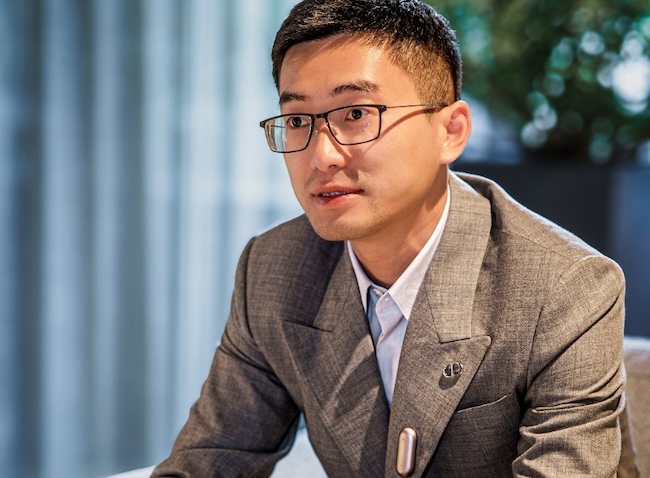Nathan Xu Goes TransPacific for Quick AI Profitability
By Tom Kagy | 03 Sep, 2025
The insight that selling the Plaud AI NotePin in China would merely invite cutthroat competition helped a Chinese entrepreneur build a lucrative American business.
A digital recorder bundled with an AI-powered transcription software doesn't scream "quick fat profits". Instead it sounds like the recipe for another flop among hundreds of similar AI powered devices littering both Shenzhen and Silicon Valley.
The Plaud AI NotePin can record 20 hours and provide a searchable transcript on a single charge.
The AI recorder segment is crowded with options like Avoma, Fathom, Fireflies.ai and Bluedot — among dozens of others as well as smartphone apps providing similar functionality. Yet that's precisely the crowded segment Nathan Xu targeted with his Plaud AI notetaker after three tech startup failures in China.
The Plaud Note is the size of a credit card and attaches to a smartphone to record calls and meetings with AI-based transcripts.
But the Wuhan University grad made the savvy decision to bypass the Chinese market entirely and look overseas for customers after partnering with Charles Liu, a Shenzhen factory owner with experience in making smartwatches.
The product they developed is NotePin, a brooch-sized lapel wearable that can record 20 hours of meetings and use AI to produce searchable transcriptions. The duo's decision to sell their products only outside China was based on a desire to avoid competing products from Xiaomi and Huawei, as well as Shenzhen’s countless knockoff factories.
"In China you're going to have overnight competition and will always have to compete hard on price,” Xu told Forbes.
To give their product cutting-edge AI capabilities, in 2023 Xu and Liu decided to license Open AI technology and open a San Francisco office to become Plaud's headquarters, while keeping the manufacturing in Shenzhen.
At $159 apiece the NotePin quickly won favor with 1 million buyers. Thanks to a $99 annual subscription fee for the AI transcription, Plaud already takes in about $250 million in annual revenues, with a 25% margin on every sale, on par with Apple in terms of profitability. The pricing seems smart: the segment's leading players charge between $10 and $19 per month payable annually, significantly more than Plaud's subscription fee.
“In the next decade, every single person is going to have a wearable AI device,” Xu told Forbes. “It will be more popular than smartphones.”
Remarkably Plaud has managed to attain something quite rare in the AI segment — profitability in less than two years without taking on venture capital other than their own resources and a $1 million crowdfunding campaign. Their foundational bet is that AI wearables like NotePin can take a healthy bite out of the $540 billion smartphone market. Of course skeptics point out that similar AI functionality will soon be provided by virtually every smartphone paired with an app and a wearable.
After graduating from Wuhan University Nathan Xu sidetracked from a banking career and bet on a website to help Chinese students gain admission into overseas colleges. Two more flops later Xu went to work as a venture capitalist for China Growth Capital. One of his first projects was the Indonesian digital bank Akulaku now valued at $2 billion.
“He was always trying to find ways to be part of the frontier,” said Wayne Shiong, one of his former employers at China Growth. “Nathan is more of a Silicon Valley type than the typical Chinese entrepreneur."
By 2021 Xu again experienced the startup itch. He and partner Charles Liu decided to produce Izyrec, a miniature $50 recorder designed to bug cheating spouses. It sold well. But the 2022 launch of ChatGPT excited Xu with the possibilities of bigger scale. They settled on the name Plaud and launched a Kickstarter campaign in 2023 to help finance its first product. It was called Note, essentially the same product as the Izyrec but priced three times as high.
It netted over $1 million in pre-orders. The product's ChatGPT-powered app could transcribe and summarize calls for those who bought the premium subscription.
“I wanted to create a beautiful business and software gives it a moat and sustainability,” Xu explained.
It didn't take Xu long to see that Plaud’s user base could be expanded with special templates to fit the needs of doctors, account teams, educators, engineers, real estate agents and other professionals who took meetings and calls. Note was followed by Note Pro and NotePin, along with various new features to expand their use cases and widen the moat Xu seeks to build around a fast-moving niche.

Nathan Xu is a China native who made the decision to headquarter his business in the US. (Nathan Xu photo)
Asian American Success Stories
- The 130 Most Inspiring Asian Americans of All Time
- 12 Most Brilliant Asian Americans
- Greatest Asian American War Heroes
- Asian American Digital Pioneers
- New Asian American Imagemakers
- Asian American Innovators
- The 20 Most Inspiring Asian Sports Stars
- 5 Most Daring Asian Americans
- Surprising Superstars
- TV’s Hottest Asians
- 100 Greatest Asian American Entrepreneurs
- Asian American Wonder Women
- Greatest Asian American Rags-to-Riches Stories
- Notable Asian American Professionals

